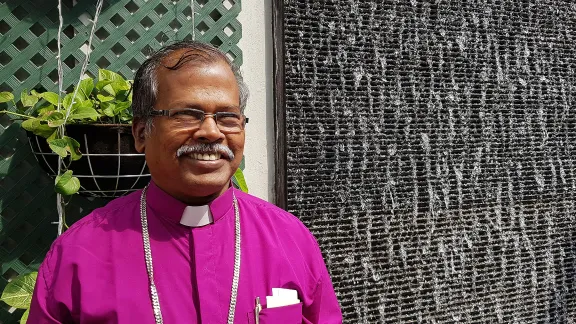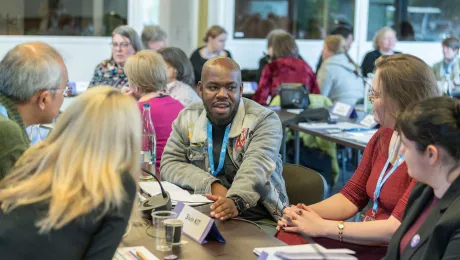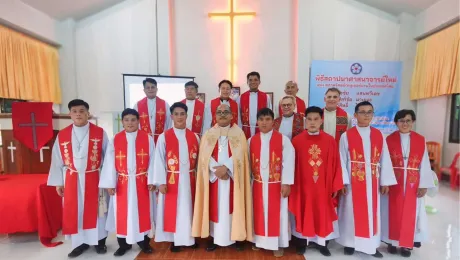
Bishop Daniel Jayaraj, Tamil Evangelical Lutheran Church. Photo: LWF/P. Lok
Interview with newly consecrated Bishop Daniel Jayaraj
(LWI) - The Tamil Evangelical Lutheran Church (TELC) is marking two major milestones this year—its 100th anniversary as an independent church body in India, and the consecration of a newly elected leader Bishop Daniel Jayaraj.
Its constitution as TELC on 14 January 1919 emerged from a joint venture by the Danish Halle Mission, the Leipzig Evangelical Lutheran Mission and the Swedish Mission. But it’s a church with a three-century mission history, dating back to 1707 when German Protestant missionaries dedicated the Jerusalem Church, the first chapel to be set up in the coastal town of Tranquebar, at the time a Danish colony. This was followed by the first Tamil translation of the New Testament in 1711 and its printing two years later.
The church is involved in the village gospel ministry through which many churches are being planted in remote areas.
In an interview with Lutheran World Information (LWI) Jayaraj, who was consecrated as the 13th Bishop of Tranquebar on 14 January, describes TELC as a multifaceted church, witnessing to Christ among the people of Tamil Nadu through its educational and medical missions. The church largely consists of Dalits but includes people who belong to all castes worshipping together. “The church is involved in the village gospel ministry through which many churches are being planted in remote areas,” he says.
The 200,000-member church was one of the founding member churches of The Lutheran World Federation (LWF) in 1947.
Working for social justice
Preaching the gospel and working for social justice remain key to TELC’s agenda, according to Jayaraj. Its mission is primarily focused in rural, remote villages among Dalits and tribal people. It has 126 pastorates with up to 12 congregations each. Its centenary celebrations, the bishop notes, also highlight that “it was the first church in India to have a printing press to print the gospel messages.”
But there are concerns related to the local context. “Social conflicts based on [affiliation to different groups], poor maintenance of the church’s properties, unemployment among the youth, lack of financial support for medical hospitals are the immediate challenges that we face in the church,” he says. However, undertaking mission work in the country’s political environment remains one of the greatest challenge, he adds.
The TELC maintains gender justice as an important aspect of its ministry and it has more than 20 women pastors. But Jayaraj notes, “There is a long way to go to achieve gender justice, which we have started implementing slowly in all spheres of our church ministry.” This includes encouraging youth to participate in the church’s programs so that they can become aware of gender justice issues, particularly violence against women, which the bishop admits is common in Indian society.
Reconciliation and mutual sharing
Talking about the current issues for the church at this important time in its history, Jayaraj says his election came after a difficult period of internal conflict that saw Indian courts take over the church’s administration in 2016, appointing a caretaker for its “spiritual” matters. His consecration therefore symbolizes reconciliation between the factions within the church. He points out however, “More reconciliation work needs to be done among the members of the congregations for unity and peace.”
The TELC bishop talks about the value of its national and global Lutheran networks, the LWF and the United Evangelical Lutheran Churches in India (UELCI)-- which brings together the 12 Lutheran churches in India.
“The UELCI is united as a Lutheran family in India. Our church’s development and diaconal missions are guided by the UELCI. We get opportunities to send our youth, pastors and lay leaders to train in mission and social work,” Jayaraj says.
Whenever there is a natural disaster, the church receives assistance from the UELCI. However, there is also a need for some of the better off congregations to assist victims of natural disasters, he adds.
He describes the relationship with the LWF as equally important especially in mutual sharing with the wider Lutheran communion. The LWF also assists needy candidates pursuing theological and other studies and supports the church’s development work.
Missionary in Sweden, Bishop of Tranquebar
Ordained in 1986, Jayaraj, 63, earned a Bachelor of Divinity degree from the Tamil Nadu Theological Seminary and completed a post-graduate degree in religion at Madurai Kamarajar University. After his ordination, he worked as a missionary in Sweden from 1991 to 1995, and upon his return home continued serving in TELC parishes.
Bishop Daniel Jayaraj is married with two adult children.
The Lutheran World Federation is a global body that shares the work and love of Christ in the world. In this series, we profile church leaders and staff as they discuss topical issues and set out ideas for building peace and justice in the world, ensuring the churches and communion grow in witness and strength.


